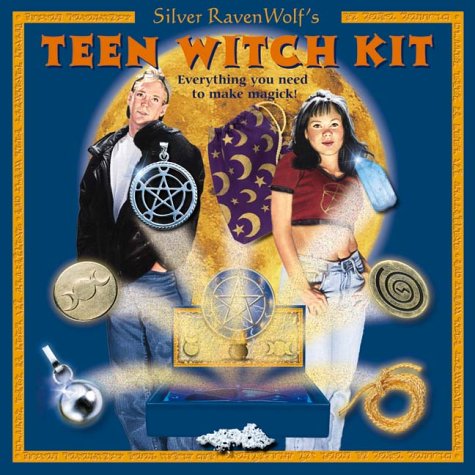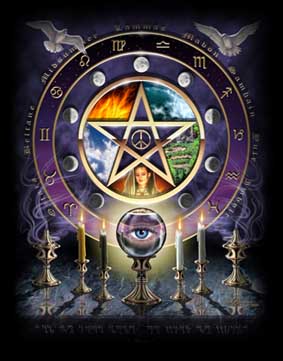TEENS AND WICCA
Why (and how) many youth are drawn to Wicca
"... the sin of
witchcraft..." -1st Samuel 15:23
By B.A. Robinson
Why are so many teens drawn to Wicca?
 Youth often go through a period of spiritual searching. They sometimes
abandon the religion of their parents, and seek a different religious group or
spiritual movement that is more suited to their beliefs. Some of the factors in
Wicca that they might find attractive are:
Youth often go through a period of spiritual searching. They sometimes
abandon the religion of their parents, and seek a different religious group or
spiritual movement that is more suited to their beliefs. Some of the factors in
Wicca that they might find attractive are:
- Lack of sexist beliefs and practices: A common principle in many
Wiccan traditions is the equality between the sexes. Both men and women are
viewed as having their female and male side. Each person has the task of
balancing the two. Within Wicca, the female principle is considered as
powerful and sometimes even more important than the male.
Wiccans commune with the Goddess and the God. Many teens reject the male
domination seen in many Christian denominations -- particularly in Roman
Catholicism and in some faith groups within the conservative wing of
Protestantism. Here, positions of power and authority are reserved for men.
Wiccans view the female and male principle in balance everywhere in the
universe.
- Concern for the environment: Like all other aboriginal and
aboriginal-based religions, Wiccans are deeply concerned about the
environment. They strongly respect and care for the earth itself, and all of
its species of animals and plants. They feel closely tuned to the cycles of
nature and to the earth itself. They reject the concept, mentioned in Genesis
1:28, that mankind is to subdue the earth and to dominate all of its living
creatures. They feel that humans should live in cooperation with other species
and with the universe.
- Public perception of Wicca: Wicca is becoming more acceptable to
teens because the public's perception of Wicca/Witchcraft has improved over
the past centuries:
- Morality: Many young people view traditional moral beliefs of the
dominant religions to be excessively restrictive. This is particularly true in
the case of sexual morality. Remaining a virgin until marriage was easier to
accomplish in previous eras when the time interval between the onset of
puberty and marriage was only a few years -- perhaps only a few months. But,
in recent decades, the menarche and its resultant hormonal overload has
occurred earlier, while the average age at marriage has increased greatly. The
gap between puberty and marriage is approaching 15 years; less than 10% of
brides and grooms are virgins at their first marriage. Most have lived
together before tying the knot.
The Wiccan religion does not have a list of "thou shalt nots." It has a
single, universal rule of behavior: the
Wiccan Rede. This
states "An it harm none, do as thou wilt." i.e. do whatever you want as
long as it harms nobody including yourself. The decision whether to become
sexually active before marriage is thus not banned by an absolute prohibition.
A Wiccan makes her/his decision is based on an analytical process which
determines the potential for harm to either party. Instead of pre-marital sex
being prohibited, it is can be seen as a morally positive activity in some
circumstances, as long as precautions are first taken to avoid pregnancy,
sexually transmitted disease, health problems, negative effects on the
relationship, and damage to each person's self-esteem.
- Personal involvement: Some youth are unhappy with the church of
their parents because direct participation is lacking. They view the minister
performing rituals and the congregation passively watching. In Wicca, they
have the opportunity to perform rituals either alone as a solitary
practitioner, or as a member of a coven. They often create rituals of their
own -- a function that is inconceivable in many other religions.
- Lack of discrimination: Many teenagers are repulsed by the current
level of discrimination within some Christian churches in the areas of gender,
sexual orientation, religious belief, and marital status. They see Wicca as
being more tolerant, more accepting of diversity, and promoting a higher
standard of morality than many Christian denominations.
- Flexibility: A Wiccan can cast a circle and perform other rituals
either alone or within a group. They can do this in any location on earth. It
can be performed inside or out of doors, at any time of day and any day of the
year. They can concentrate on whichever parts of Wicca that interest them.
Some stress spells; others divination. Some concentrate on healing rituals;
others on worship.
- Quest for power: Many teens are at least initially attracted to
Wicca for all the wrong reasons. They believe some of the propaganda in movies
about Witchcraft:
- They expect that they will learn spells that will enable them to gain
control over their lives; they will be able to dominate, manipulate, and
control other people.
- They assume that Wiccans all wear all-black clothing and scare their
friends with threats of curses.
Many teenagers with these beliefs drift away from Wicca as soon as they
learn what it is truly about -- that any form of manipulation or harm to
others is forbidden. However, some to stay long enough to realize that Wicca
is a religious and spiritual path with a lot to offer a minority of people.
They learn that Wicca path is for personal spiritual growth, and not for
impressing others.
How many Wiccan youth are
there?
 There is no method by which an accurate estimate can be made of the number
of Wiccans in
North America. Phyllis Curott, author of an autobiographical Wiccan journal "Book
of Shadows" is reported as estimating the number in the U.S. as 3 to 5
million. 2 This seems high. Because of the decentralized
nature of the religion, no records are kept of the Wiccan population. However,
various attempts to estimate the number have been based on book sales and the
numbers of visitors to Wiccan festivals. U.S. estimates of 250,000 to 400,000
Wiccans are typical.
There is no method by which an accurate estimate can be made of the number
of Wiccans in
North America. Phyllis Curott, author of an autobiographical Wiccan journal "Book
of Shadows" is reported as estimating the number in the U.S. as 3 to 5
million. 2 This seems high. Because of the decentralized
nature of the religion, no records are kept of the Wiccan population. However,
various attempts to estimate the number have been based on book sales and the
numbers of visitors to Wiccan festivals. U.S. estimates of 250,000 to 400,000
Wiccans are typical.
Estimating the number of Wiccan youth is even less accurate. However, there
are some indications that the total number of members is large and is growing
quickly:
References:
- Ashlynn's Grove has reviews of selected films with Pagan and/or
Occult themes at:
http://paganism.com/ag/articles/films2.html
- Phyllis Curott, "Book of Shadows: A modern woman's journey into the
wisdom of witchcraft and the magic of the Goddess," Broadway books,
(1999). This book is written in the form of an autobiographical Wiccan's
journal as she transitions from her legal world of facts and evidence into
the Witch's world of imagination and spirituality. You
can read reviews or buy this book.
- "Teen Witch: Wicca for a new generation," Llewellyn, (1999). If
you can get past the book's truly awful cover, the contents give an
excellent introduction to Wicca for youths, and some guidance for parents.
You can read reviews and/or safely order this book from Amazon.com
- Catherine Edwards, "Wicca casts spell on teen-age girls," Insight
Magazine, 1999-OCT.
- Spiritual Counterfeits Project has a web site at:
http://www.scp-inc.org/ They have a
counseling hotline at access@scp-inc.org
or (510) 540-5767.
- The Witch's Voice has a website at:
http://www.witchvox.com/
Copyright © 1999 to 2005 by
Ontario Consultants on Religious Tolerance
Latest update: 2005-FEB-12
Author: B.A. Robinson
SOURCE
Witchcraft is Evil
Wiccan Deities
Harry Potter Exposed
Ye Must Be Born Again!

"Ye that love the LORD, hate evil..." -Psalm 97:10

 Youth often go through a period of spiritual searching. They sometimes
abandon the religion of their parents, and seek a different religious group or
spiritual movement that is more suited to their beliefs. Some of the factors in
Wicca that they might find attractive are:
Youth often go through a period of spiritual searching. They sometimes
abandon the religion of their parents, and seek a different religious group or
spiritual movement that is more suited to their beliefs. Some of the factors in
Wicca that they might find attractive are: There is no method by which an accurate estimate can be made of the number
of
There is no method by which an accurate estimate can be made of the number
of 
